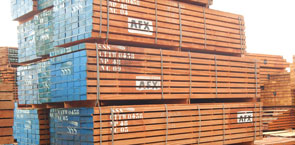Time to include the timber trade in FLEGT
After more than 10 years of implementation, the EU Forest Law Enforcement, Governance and Trade (FLEGT) Action Plan has achieved tremendous results. In particular, it has raised the global focus on illegal logging and supported forest governance in a range of timber producing countries. However, the trade aspect of FLEGT has yet to fulfil its potential.
Now it is time for the EU to consider how the vast FLEGT effort made by the EU, governments, NGOs and other organisations may also benefit the timber trade.
The EU anti-illegal timber initiative FLEGT stands for Forest Law Enforcement, Governance and Trade. In terms of Law Enforcement and Governance, it has already achieved much in terms of improving forestry and timber sector controls, legality assurance and transparency in supplier countries signed up to it. Now the benefits it can have for the international timber trade must be explored and exploited.
Barriers to linking FLEGT and the EUTR
 With the EU Timber Regulation (EUTR) in force, the industry is facing challenges in assuring legal supplies of timber and meeting obligations to document their efforts. The EUTR provides a green lane for FLEGT licensed timber, but to date no FLEGT timber is available to buy.
With the EU Timber Regulation (EUTR) in force, the industry is facing challenges in assuring legal supplies of timber and meeting obligations to document their efforts. The EUTR provides a green lane for FLEGT licensed timber, but to date no FLEGT timber is available to buy.
So can FLEGT be of use to the EU timber trade? Yes it can, but challenges persist:
Firstly, a lot of confusion amongst the EU industry stems from misinterpretations. For instance there is a perception that a FLEGT Voluntary Partnership Agreement (VPA) signed by a supplier country signifies their EUTR compliance. It does not and importers are running a legal risk if they omit due diligence based on such false beliefs.
Secondly, the timber tracking system implemented under a FLEGT VPA focuses on producer country tracking of timber. So in cases where FLEGT licensed timber will be exported to third countries for processing and subsequent re-export to the EU, the tracking of the FLEGT license claim will depend on the existence of CoC systems in processing countries.
Thirdly, the FLEGT process has produced a wealth of information on producer countries including forest sector legality analyses, monitoring systems, and clarifications on applicable legislation. All of this is potentially hugely beneficial to importers in the EU; however, the data is often not yet available in a format that is useful to anyone but full time forest legality experts.
Making FLEGT work for EUTR due diligence
Why not create more synergy between the FLEGT and the EUTR initiatives to make more efficient use of existing resources and provide much needed support to the industry? For example, this could be done by:
- Providing targeted information for the industry, in both EU and in producer countries, removing misconceptions and providing guidance on how to verify legality in VPA processes.
- Exploring the potential for FLEGT to adopt a risk based evaluation method that correlates with the EUTR due diligence systems.
- It is clear that the industry needs to address EUTR requirements; given the governance challenges to address FLEGT licensing can take time. We are interested in looking at approaches to facilitate this dilemma, such as how the private sector can apply certification schemes or risk based due diligence systems using FLEGT lessons to focus on sub sets of forest areas, supply chains, or subnational regions.,
- Ensuring that national Timber Legality Assurance Systems - the basis for FLEGT licenses - cover supply chain traceability, including situations where material is imported from third countries.
- Making sure that FLEGT related data is made accessible in a format that supports the trade in legal timber products.
Such actions could facilitate legal timber trade even before the arrival of FLEGT timber on the marketplace. I firmly believe this to be possible without jeopardising past achievements, or ignoring the other important aspects of the FLEGT Action Plan.
 Viewpoint by Christian Sloth, NEPCon Forest Legality Programme Manager. This article was first published in a slightly different format in the July 2014 edition of the ETTF newsletter.
Viewpoint by Christian Sloth, NEPCon Forest Legality Programme Manager. This article was first published in a slightly different format in the July 2014 edition of the ETTF newsletter.
This article was amended on 10 September 2015 to improve its clarity and accuracy regarding the FLEGT scope and process.



